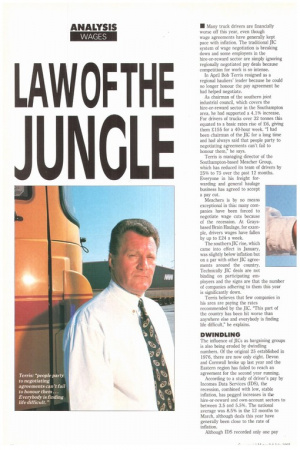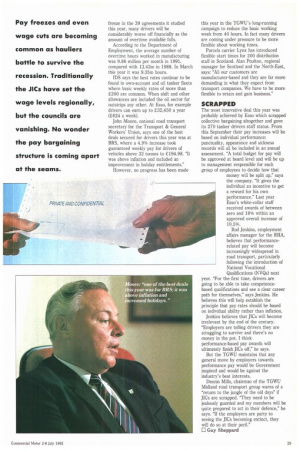LAWOFTHE JUNGLE
Page 30

Page 31

If you've noticed an error in this article please click here to report it so we can fix it.
• Many truck drivers are financially worse off this year, even though wage agreements have generally kept pace with inflation. The traditional JIC system of wage negotiation is breaking down and some employers in the hire-or-reward sector are simply ignoring regionally negotiated pay deals because competition for work is so intense.
In April Bob Terris resigned as a regional hauliers' leader because he could no longer honour the pay agreement he had helped negotiate.
As chairman of the southern joint industrial council, which covers the hire-or-reward sector in the Southampton area, he had supported a 4.1% increase. For drivers of trucks over 32 tonnes this equated to a basic rates rise of £6, giving them £155 for a 40-hour week. "I had been chairman of the JIC for a long time and had always said that people party to negotiating agreements can't fail to honour them," he says.
Terris is managing director of the Southampton-based Meacher Group, which has reduced its team of drivers by 25% to 75 over the past 12 months. Everyone in his freight forwarding and general haulage business has agreed to accept a pay cut.
Meachers is by no means exceptional in this: many companies have been forced to negotiate wage cuts because of the recession. At Graysbased Brain Haulage, for example, drivers wages have fallen by up to £24 a week.
The southern JIC rise, which came into effect in January, was slightly below inflation but on a par with other JIC agreements around the country. Technically JIC deals are not binding on participating employers and the signs are that the number of companies adhering to them this year is significantly down.
Terris believes that few companies in his area are paying the rates recommended by the JIC. "This part of the country has been hit worse than anywhere else and everybody is finding life difficult," he explains.
DWINDLING
The influence of J1Cs as bargaining groups is also being eroded by dwindling numbers. Of the original 25 established in 1976, there are now only eight. Devon and Cornwall broke up last year and the Eastern region has failed to reach an agreement for the second year running.
According to a study of driver's pay by Incomes Data Services (IDS), the recession, combined with low, stable inflation, has pegged increases in the hire-or-reward and own-account sectors to between 3.5 and 5.5%. The national average was 8.5% in the 12 months to March, although deals this year have generally been close to the rate of inflation.
Although IDS recorded only one pay freeze in the 39 agreements it studied this year, many drivers will be considerably worse off financially as the amount of overtime available falls.
According to the Department of Employment, the average number of overtime hours worked in manufacturing was 9.86 million per month in 1991, compared with 13,42m in 1988. In March this year it was 9.35m hours, IDS says the best rates continue to be found in own-account and oil tanker fleets where basic weekly rates of more than E200 are common. When shift and other allowances are included the oil sector far outstrips any other. At Esso, for example drivers can earn up to E32,450 a year (E624 a week).
John Moore, national road transport secretary for the Transport & General Workers' Union, says one of the best deals secured for drivers this year was at BRS, where a 4.9% increase took guaranteed weekly pay for drivers of vehicles above 32 tonnes to E194.98. "It was above inflation and included an improvement in holiday entitlements."
However, no progress has been made this year in the TGWU's long-running campaign to reduce the basic working week from 40 hours. In fact many drivers are coming under pressure to be more flexible about working times.
Parcels carrier Lynx has introduced flexible start times for 200 distribution staff in Scotland. Alan Poulton, regional manager for Scotland and the North-East, says: "All our customers are manufacturer-based and they are far more demanding in what they expect from transport companies. We have to be more flexible to retain and gain business."
SCRAPPED
The most innovative deal this year was probably achieved by Esso which scrapped collective bargaining altogether and gave its 270 tanker drivers staff status. From this September their pay increases will be based on individual performance: punctuality, appearance and sickness records will all be included in an annual assessment. "A total budget for pay will be approved at board level and will be up to management responsible for each group of employees to decide how that money will be split up," says the company. "It gives the individual an incentive to get a reward for his own performance." Last year Esso's white-collar staff received awards of between zero and 18% within an approved overall increase of 10.5%.
Rod Jenkins, employment affairs manager for the RHA, believes that performancerelated pay will become increasingly widespread in road transport, particularly following the introduction of National Vocational Qualifications (NVQs) next year. For the first time, drivers are going to be able to take competencebased qualifications and see a clear career path for themselves," says Jenkins. He believes this will help establish the principle that pay rates should be based on individual ability rather than inflation.
Jenkins believes that JICs will become irrelevant by the end of the century. "Employers are telling drivers they are struggling to survive and there's no money in the pot. I think performance-based pay awards will ultimately finish JICs off," he says.
But the TGWU maintains that any general move by employers towards performance .pay would be Government inspired and would be against the industry's best interests.
Dennis Mills, chairman of the TGWU Midland road transport group warns of a "return to the jungle of the old days" if JICs are scrapped. "They need to be jealously guarded and my members will be quite prepared to act in their defence," he says. "If the employers are party to seeing the JICs becoming extinct, they will do so at their peril."
0 Guy Sheppard
















































































